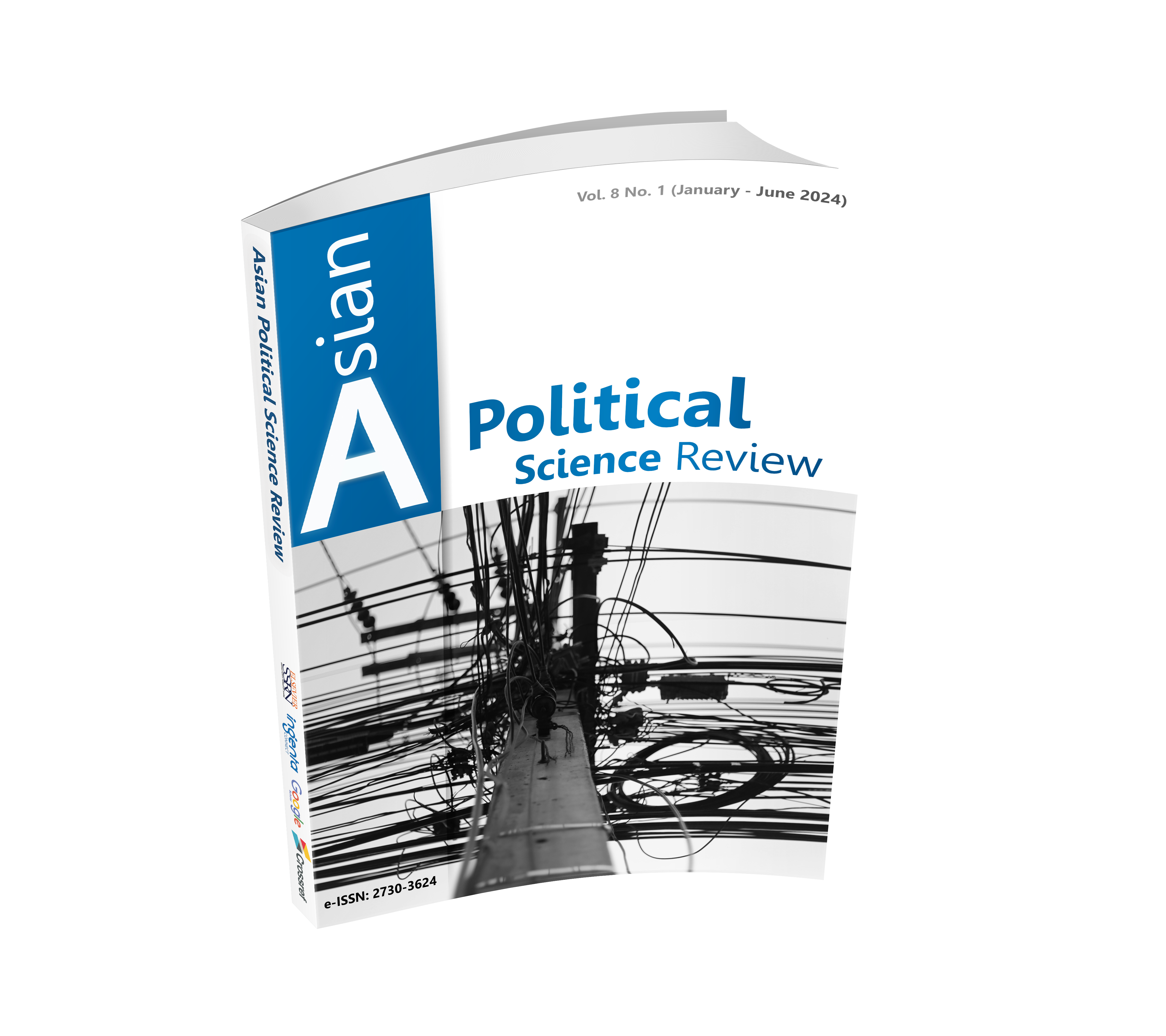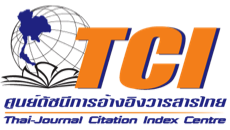COMPARATIVE STUDY OF POVERTY REDUCTION STRATEGIES BETWEEN THAILAND AND NIGERIA
DOI:
https://doi.org/10.14456/apsr.2024.9Keywords:
ECOWAS, ASEAN, MDGs, SDGs, Poverty ReductionAbstract
Poverty remains a significant challenge around the world. In 1990, it was estimated that 1.9 billion people were living in extreme poverty 36% of the world population. In 2015, global poverty estimated that 735 million people were living in extreme poverty 10% of the world population. Thailand has implemented a poverty alleviation strategy and has achieved. In contrast Nigeria has failed in implementing poverty reduction strategies. Therefore, the objectives of this study are to 1) examine the poverty and factors that cause high poverty rate in Nigeria from 1990 to 2022. 2) To analyze the strategies that Thailand implemented on poverty reduction from 1990 to 2022. And 3) to propose the recommend that Nigeria should adapt from Thailand. The data collections of this study used semi structure interviews by interviewing 12 participants who have relevant experience in the area of poverty reduction. The results of the interviews illustrated the factors that are causing the poverty rate in Nigeria such as Corruption, conflict and insecurity, political democracy, Nigerian Policy implementation, inadequate infrastructure. The results also indicated the mechanism that Thailand implemented on poverty reduction such as: comprehensive sustainable development, social protection, human capital, sufficiency economy, and food security. From the conducted interviews the discussion identifies the three main factors providing high poverty rate in Nigeria which are: Corruption, conflict and insecurity, inadequate access to employment opportunities Also, the five main strategies that Thailand implemented on poverty reduction are: comprehensive sustainability, human capital, social welfare and protection net.
Downloads
References
Adelaja, A., & George, J. (2019). Effects of Conflict on Agriculture: Evidence from the Boko Haram Insurgency. World Development, 117, 184-195.
Adelman, I., & Morris, C. (1997). Editorial: Development History and its Implications for Development Theory. World Development, 25(6), 831-840.
Asian Development Bank. (2010). ADBI Year in Review 2009. Retrieved from www.adb.org/sites/default/files/institutional-document/159288/adbi-yir-2009.pdf.
Asian Development Bank. (2023). Poverty Data: Thailand. Retrieved from www.adb.org/where-we-work/thailand/poverty.
Attavanich, W., Chantarat, S., Chenphuengpawn, J., Mahasuweerachai, P., & Thampanishvong, K. (2019). Farms, Farmers and Farming: A Perspective through Data and Behavioral Insights (No. 122). Bangkok: Puey Ungphakorn Institute for Economic Research.
Atuobi, S. (2007). Corruption and State Instability in West Africa: An Examination of Policy Options (KAIPTC Occasional Paper No.21). Ghana: Kofi Annan International Peacekeeping Training Centre.
Bala, B., & Tar, U. (2021). Regional Cooperation in West Africa: Counter-Terrorism and Counter-Insurgency. African Security, 14(2), 186-207.
Börzel, T. (2013). Comparative Regionalism: European Integration and Beyond. In W. Carlsnaes, T. Risse, B. Simmons, & A. Beth. (eds.). Handbook on International Relations (pp. 503-531). London: Sage.
Day, J. (2022). 14 Principles of Democracy. Retrieved from www.liberties.eu/en/stories/principles-of-democracy/44151.
Development Initiatives. (2019). Poverty Trends: Global, Regional and National. Retrieved from https://devinit-prod-static.ams3.cdn.digitaloceanspaces.com/media/documents/Poverty_trends_-_global_regional_and_national.pdf.
Development Initiatives. (2021). Poverty Trends: Global, Regional and National. Retrieved from https://devinit-prod-static.ams3.cdn.digitaloceanspaces.com/media/documents/Poverty_trends_-_global_regional_and_national_-_November_2021.pdf.
Gaal, H., & Afrah, N. (2017). Lack of Infrastructure: The Impact on Economic Development as a Case of Benadir Region and Hir-shabelle, Somalia. Developing Country Studies, 7(1), 49-55.
Gundersen, C., & Ziliak, J. (2015). Food Insecurity and Health Outcomes. Health Affairs, 34(11), 1830-1839.
Gutkind, P., & Wallerstein, I. (1976). The Political Economy of Contemporary Africa. California: Sage Publications.
Helble, M., Trinh, L., & Le, T. (2019). Sectoral and Skill Contributions to Labor Productivity in Asia (Working Paper 929). Tokyo: Asian Development Bank.
Mansfield, E., & Pevehouse, J. (2013). The Expansion of Preferential Trading Arrangements. International Studies Quarterly, 57(3), 592-604.
Meechoovet, Y. (2022). Thailand’s Smart Agriculture and Its Impacts on Thai Farmers: A Case Study of Smart Agriculture in Ayutthaya Province. Master of Arts Thesis, Rangsit University.
Müller-Jung, F., & Oneko, S. (2018). Nigeria’s Communal Violence: It’s About More Than Land. Retrieved from www.dw.com/en/nigerias-communal-violence-its-about-more-than-land/a-43550443.
National Social Security Strategy of Bangladesh. (2017). Sustainable Development Goals and Social Protection. Retrieved from https://socialprotection.gov.bd/wp-content/uploads/2017/12/Sustainable-Development-Goals.pdf.
Nayyar, D. (2019). Asian Transformations: An Inquiry into the Development of Nations. Oxford: Oxford University Press.
Orogun, P. (2010). Resource Control, Revenue Allocation and Petroleum Politics in Nigeria: The Niger Delta Question. GeoJournal, 75(5), 459-507.
Oye, W. (2013). Nigeria, Thailand agree to double trade to $3b by 2018. Retrieved from https://theeagleonline.com.ng/nigeria-thailand-agree-to-double-trade-to-3b-by-2018/.
Rostow, W. (1990). The Stages of Economic Growth: A Non-Communist Manifesto. Cambridge: Cambridge University Press.
Tephaval, C. (2019). How Countries in Southeast Asia are Working Together to Accelerate Human Capital Development. Retrieved from www.worldbank.org/en/news/feature/2019/09/28/how-countries-in-southeast-asia-are-working-together-to-accelerate-human-capital-development.
United Nations. (1950). The Economic Development of Latin America and Its Principal Problems. New York: United Nations.
United Nations. (2015a). The Millennium Development Goals Report 2015. Retrieved from www.un.org/millenniumgoals/2015_MDG_Report/pdf/MDG%202015%20rev%20%28July%201%29.pdf.
United Nations. (2015b). Transforming Our World: The 2030 Agenda for Sustainable Development. Retrieved from https://sdgs.un.org/publications/transforming-our-world-2030-agenda-sustainable-development-17981.
United Nations. (2019). The Sustainable Development Goals Report 2019. Retrieved from https://unstats.un.org/sdgs/report/2019/The-Sustainable-Development-Goals-Report-2019.pdf.
World Bank. (2018). LEARNING to Realize Education’s Promise. Retrieved from www.worldbank.org/en/publication/wdr2018#.
Wratten, E. (1995). Conceptualizing Urban Poverty. Environment and Urbanization, 7(1), 11-38.

Downloads
Published
How to Cite
Issue
Section
License
Copyright (c) 2024 Authors

This work is licensed under a Creative Commons Attribution-NonCommercial-NoDerivatives 4.0 International License.











.png)


